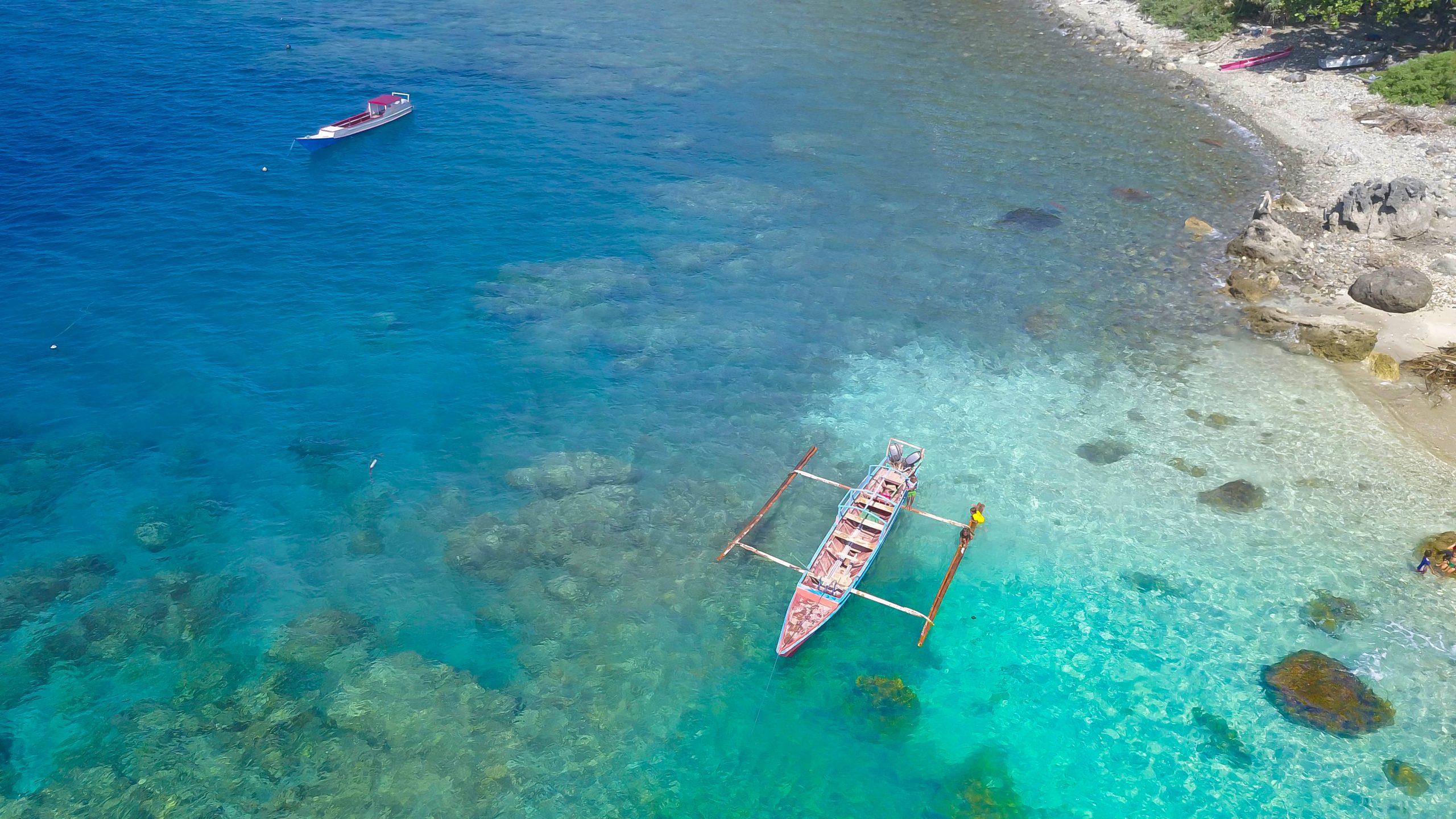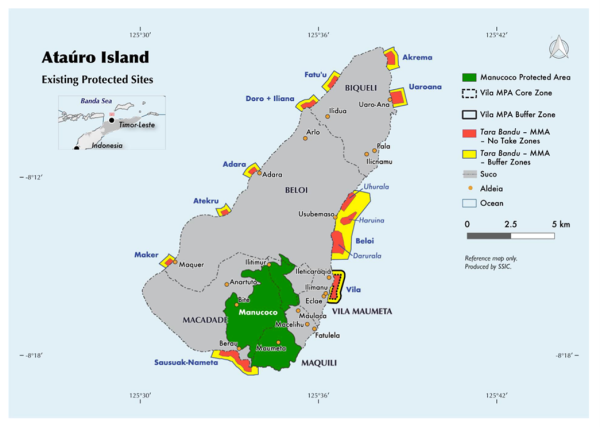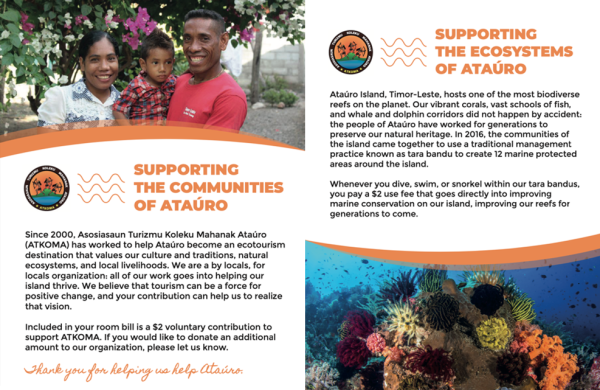
Ataúro Island is a 25km stretch of volcanic rock home to the most biodiverse reefs in the world, situated just north of Dili, the capital city of Timor-Leste. A group of tourism advocates has been working together since 2000 to pursue a common vision for developing low-impact tourism in Ataúro. Comprised of local tourism providers and community representatives, the local Destination Management Organization (DMO) of Ataúro—the Asosiasaun Turizmu Koleku Mahanak Ataúro (ATKOMA)—has not only advocated for the interests of the tourism industry and future visitors, but is also committed to ensuring tourism economically supports the people of Ataúro and minimizes negative environmental and socio-cultural impacts. Critically, the DMO and its leadership team has been instrumental in both financing and facilitating the establishment of 13 Locally Managed Marine Areas (LMMA) known as tara bandu areas (IUCN Category V) around the island and advocating for the legal recognition of their traditional management from the Government of Timor-Leste.
A survey of coral reefs conducted by Conservation International in July 2016 reported that Ataúro Islands hosts the highest average fish diversity globally. The 10 study sites averaged 253 reef fish species per site, including one site where 315 species – the third highest globally – were recorded. As this work was underway to survey biodiversity, Adara, on the west side of the island, was the flagship community in implementing a no-take LMMA through tara bandu on Ataúro on May 13th, 2016 following 12 months of community consultation (Mills & Tilley, 2017; Tilley et al., 2019). ATKOMA’s (first and former) President “Super” Mario Gomes, originally from Adara, was instrumental in initiating this first LMMA. Villages Beloi and Vila then established similar MPAs through tara bandu in 2017 and 2018, respectively. By the end of 2019, almost all communities (13 total) on Ataúro had implemented tara bandu LMMAs, covering a combined area of 1,308 ha, of which 37 percent (488 ha) are ‘no take’ (See Map). Ataúro Island Existing LMMAs. From the “Ataúro Island Sustainable Management Plan”
Ataúro Island Existing LMMAs. From the “Ataúro Island Sustainable Management Plan”
Under the support of the USAID Tourism for All Project, ATKOMA was legally registered as the first DMO in the country on Ataúro Island in 2019, with Mario Gomes as ATKOMA’s first President. In addition to functioning as a traditional DMO—helping with visitor bookings, delivering marketing benefits to business members, and advocating for local tourism ownership on the island—ATKOMA has been instrumental in reviving the customary traditional ecological management practice of tara bandu. ATKOMA does this by helping to raise guest awareness of the purpose of the tara bandu LMMAs, collect visitor fees, advocate for community needs, and increase the distribution of tourists to other areas of the island (see flyers below that are distributed to all guest houses and hotels on the island). Whenever a tourist swims or dives within one of these protected areas, they must pay a $2 fee that is distributed to the local community, ensuring that communities benefit from the protection of these incredible natural areas.

Three key elements have made the tara bandu LMMAs successful: community support, government recognition, and ecotourism integration. In Tetum, the term tara bandu literally means prohibition (bandu) by hanging (tara). Local communities repurpose traditional conservation practices through tara bandu rules to create temporary fishing, hunting and harvesting closures in certain areas. Tara bandu is both a code of behavior and a community ritual, which uses local conservation knowledge and helps expand social networks and community cooperation. As a form of customary law, Tara bandu is supported by formal law through Article 8, sub-sections 1,2 and 3 of the ‘Environmental Base Law, No. 26/2012’. Once a community agrees on a Tara Bandu, all parties are bound by it. A person found guilty of violating a Tara Bandu restriction may be fined and / or have to hand over assets to the community, with many believing such a violation incurs a curse upon that individual. However, it is important to note that tara bandu is not a formal organization in its own right, and it relies on the support from community members to uphold the law and maintain its governance structure. Some research in the past has acknowledged the existence of so-called “kableha”, a group of guardians in charge of the surveillance and monitoring of the ban. Without the complete support and buy-in from the local community, tara bandu will not work. Thus, its integration with the tourism economy—including ensuring that ATKOMA as the regional DMO is aligned with promoting the tara bandu rules and stewardship of marine resources by both guests and local communities—is critical. So far, monitoring of MMAs has indicated positive biodiversity outcomes in no-take zones.
ATKOMA has also gained numerous international recognitions for its efforts. In 2021, ATKOMA and the Ombai-Wetar Strait were nominated as a Whale Heritage Site. In 2020, this critical migratory corridor for whale and dolphin species, as well as the rich biodiverse reefs around the island, was also nominated as a Hope Spot by Mission Blue. Most recently, ATKOMA was nominated as a Top 100 Sustainability Story in Green Destination’s international competition. During the awards ceremony at the ITB Berlin Conference in March, ATKOMA won the #1 place in the Nature & Ecotourism Category, beating other internationally renowned destinations and demonstrating that true community-led tourism is the future of the ecotourism industry.
In the years prior to the COVID-19 pandemic, villages like Beloi were earning over $10,000 due to the tara bandu fee from guests. However, a critical challenge was that much of this tourism traffic was concentrated in places like Beloi (the main port city of entry onto the island). ATKOMA has been working over the past year to train tour guides, develop tour products and experiences, empower local communities, and highlight opportunities to stay with local homestays on the island. This has enabled guests to travel to other villages around the island and distribute the economic benefit to conservation of these natural areas. This fee, in addition to a variety of tours and itineraries offered by ATKOMA, has created a sustainable finance model for the organization to continue its activities. Many of the members noted that marketing benefits, while extremely beneficial, were not their primary motivation: the DMO is crucial to distributing tourisms’ benefits around the island, ensuring that all communities gain from visitors rather than just a few guest houses. Both tourism and guest experiences have flourished as a result. Travelers benefit in many ways from this initiative, including by positively benefiting the island community and the protection of its natural environment every time they choose to visit and swim in the island. Each guest pays a $2 Contribution Fee to ATKOMA to ensure that the organization can continue to provide tour guide training and booking services to the island, making the visitor experience more enjoyable and easy to reach the island where internet and cell connectivity is very poor. Guests are now able to experience tours to the other side of the island and stay with local families that traditionally did not receive many visitors. The practice and ritual of tara bandu also has much more significance than just ecological protection—and it is ATKOMA’s role as a DMO in promoting this recognition to guests to the island to maintain respect and reverence for local cultural traditions. On December 8th, 1975, nine days following the Fretilin revolution that declared Timorese independence from the Portuguese, Indonesian armed forces occupied Timor-Leste and banned any traditional practices including tara bandu. These practices were replaced with regulations from the Indonesian national forestry system which failed to protect natural resources; a 2004 study in the journal Natural Resources Forum found that the last decade of Indonesian rule deforestation in the western part of Timor-Leste reached 18 percent, with fleets of ships employing destructive fishing techniques destroying marine habitats. Tara bandu is not just a way for Timorese to reclaim ownership of their natural resources; it is also a method for reclaiming their own independence by reviving ancient traditions. ATKOMA, by supporting and preserving these ancient practices and showcasing cultures and traditions to new guests on the island, is ensuring that Timorese culture and history is preserved for generations to come. |
As one of the youngest countries in the world, Timor-Leste has struggled to develop alternative economic industries to support the incredible natural resources and beauty of the country. The USAID Tourism for All Project sought to expand opportunities in tourism for the country, ensuring that it delivered positive outcomes for conservation and communities as it developed. Solimar International, a sustainable tourism for development consulting firm subcontracted on the USAID project, helped ATKOMA become the first DMO to legally register as an organization in 2019. It began developing a website for the island that has been critical to promoting ATKOMA’s members and engaging visitors in unique experiences around the island. Since then, Solimar has provided ongoing technical support including guest services, booking management, website maintenance, tour guide training, and leadership development. Uniquely, ATKOMA was able to create a sustainable finance model even when tourism was at its lowest during the COVID-19 pandemic, charging a $2 visitor fee for each guest house and hotel on the island in exchange for marketing and booking support.
Solimar International continues to support ATKOMA daily and is working on a model that will enable long-term support beyond the end of the USAID project, including using ATKOMA as a model that can replicated elsewhere. The success of ATKOMA demonstrates the power of small businesses and using the private sector for good, recognizing that projects cannot be truly sustainable until they engage long-term revenue sources, like those available in the tourism industry. While all local models must be built on and integrated with traditional ecological knowledge and management such as tara bandu, the process for establishing tourism governance in ways that benefit communities and conservation has already been and will continue to be replicated in many future destinations. Solimar is working with stakeholders in Liberia, Tunisia, the Maldives, Bangladesh, and other destinations to decentralize tourism governance to DMOs made up of local private sector stakeholders and government to ensure that tourism is run by and for local communities.
With the support of the Ataúro Island Council, ATKOMA’s amazing members, and the USAID Tourism for All Project, Solimar International hopes to see ATKOMA continue to flourish for many years to come.
There were several challenges that ATKOMA faced during the pandemic, and in some cases the LMMAs did not function well without tourism income, emphasizing the importance of additional income streams beyond tourism to enhance its resilience to impacts. However, ATKOMA changed its marketing tactics during the pandemic to appeal to domestic visitors and the expat market residing in Dili, which enabled the organization to continue selling tours and earning an income. Additionally, ATKOMA used this as a time to hear from members about their concerns, including advocating for local rather than foreign-owned, high-end tourism and ensuring that concerns about misuse of LMMAs were addressed. With the support of the Ataúro Island Council, ATKOMA’s amazing members, and the USAID Tourism for All Project, we hope to see ATKOMA and Ataúro Island flourish for many generations to come.
© Linking Tourism & Conservation (LT&C) 2019
We are grateful that you support the work and mission of LT&C! We accept donations through Credit Card, PayPal or international bank transfer:

Donate through Credit Card
Please click the Donate button and then choose your PayPal account
Bank details:
Cultura Sparebank
Pb. 6800, St. Olavs plass
N-0130 Oslo
Name: Linking Tourism & Conservation,
Account no.: 1254 05 95168
IBAN: NO8712540595168
BIC/SWIFT: CULTNOK1
Routing BIC: DNBANOKK
Please mark payments with your name and/or email address
Sign up for an LT&C membership by filling in the details below.
Would you like your LT&C-Example/Initiative to be listed on our website? Please fill in the form below.